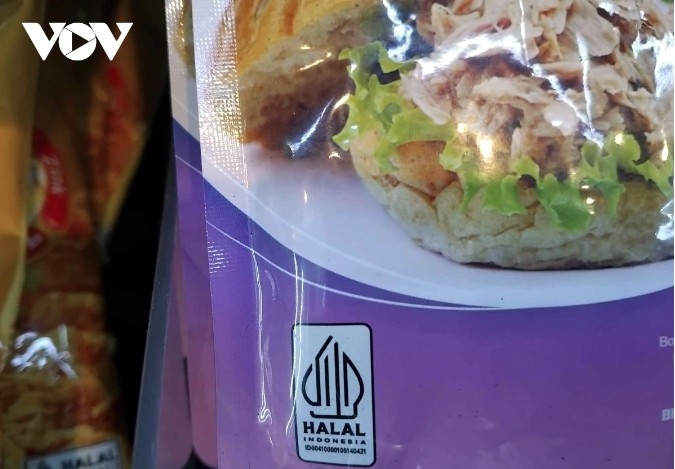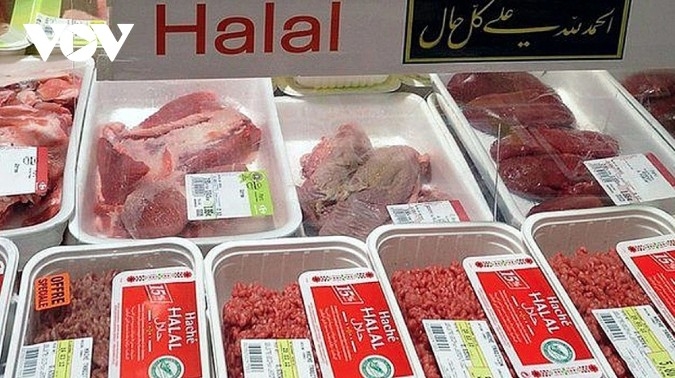Vietnam targets stronger presence in US$2 trillion Halal market
VOV.VN - Despite holding huge potential to access the US$2 trillion global Halal food market, Vietnam has yet to fully meet global Halal food demand, while currently satisfying less than 10%, but plans are underway to enhance its role in this fast-growing industry.

Vietnam boasts abundant raw materials and strong capacity to produce final Halal goods for exports. In addition, the country’s growing reputation as a top international tourist destination indicates promising prospects for the hospitality sector, including Halal restaurants and catering services.
Less than 10% of demand satisfied
Ramlan Bin Osman, Director of the National Halal Certification Centre (HALCERT) under the Ministry of Science and Technology, emphasized both opportunities and potential to expand Halal products. Vietnam’s GDP has maintained a steady annual growth of 6–7%, highlighting the strength of its domestic economy. Yet the Halal food sector remains underexploited, with less than 10% of global demand being fulfilled.
The Halal market is capturing growing interest from trade associations and industries. Tran Van Hiep, Vice Chairman of the Vietnam Cashew Association, noted that in 2024, Vietnam exported 700,000 tonnes of cashew kernels worth US$3.8 billion.
Halal certification as well as other quality control certifications are essential to ensure quality and compliance.
“In recent years, we have focused on the Halal segment. All exported cashew products now carry Halal certificates along with other quality certifications. The US remains our largest market, accounting for 30% of exports and also posing the highest Halal requirements, followed by Europe, Australia, and Middle Eastern countries,” Hiep said.
Despite the rising demand, Vietnamese exporters still face barriers in entering the Halal market. Le Phu Cuong, Head of the Vietnam Trade Office in Malaysia, said that while Halal certification is not mandatory for imports into Malaysia, many importers and distributors prioritize certified products to meet the needs of the local Muslim-majority population, which makes up around 60%.
Pham The Cuong, Vietnam’s Commercial Counselor in Indonesia, pointed to similar challenges in that country. Indonesia’s Halal certification is considered a non-tariff barrier due to its lengthy, costly, and complex approval process, which creates difficulties for small and medium-sized enterprises.
Only one certification body is currently authorized, and only for food products. In addition, strict food safety and hygiene standards must be maintained throughout the entire supply chain, not just at input stages. Vietnamese firms are also hampered by limited familiarity with the certification process and growing competition from other nations.
Halal food industry seen as key to export expansion
According to Deputy Minister of Industry and Trade Nguyen Sinh Nhat Tan, the global Halal market presents a major opportunity for Vietnamese exports. With current growth momentum, the country could substantially raise its share in this market within five years.
In a recent move, the Government Office issued Official Dispatch No. 4169 conveying Prime Minister Pham Minh Chinh’s directive on expanding exports to the Halal market. The Prime Minister assigned the Ministry of Industry and Trade and the Ministry of Foreign Affairs to study Report No. 388/2025 dated May 8, 2025, from the Government Portal and devise an action plan to promote Halal food exports.

Given its enormous potential, the Halal market is becoming a strategic avenue for Vietnamese businesses in their export expansion plans. However, to fully capitalize on this opportunity, closer coordination is needed among government agencies, enterprises, and certification bodies to develop a well-structured Halal ecosystem in line with international standards.
Vietnam should carry out targeted support policies, such as allocating budget for Halal-compliant production and certification, boosting trade promotion efforts, and providing specialized training for personnel involved in Halal certification and quality assurance.
Furthermore, credible intermediary organizations are needed to guide enterprises through the certification process and ensure regulatory compliance in target export markets.



